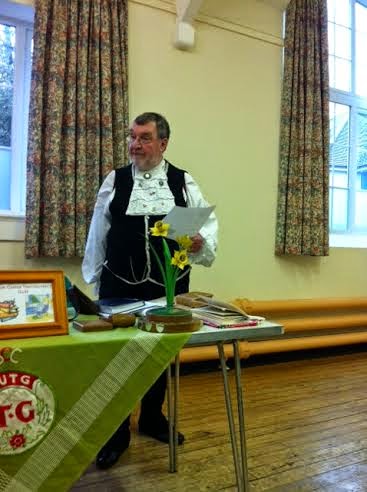A recent speaker at
the WI gave me all sorts of hints about dealing with squirrels although his
real interest was birds. Over a cup of tea I mentioned my frustration over the
four-legged friends creatures that eat all the birds food so Chris ...
that’s Chris Edwards from the RSPB (Royal Society for the Protection of Birds) ... gave me a few ideas and some leaflets.
Apparently the best way to fool squirrels is to hang a feeder
from fishing line because it’s too thin for them to get a grip. Well, that
would mean rethinking the whole problem from scratch, like where would I hang
the fishing line bearing in mind that squirrels can leap to great heights. I
suppose it would be okay if (a) there was an isolated branch about a mile high
on which to attach the line, (b) we had a tall enough ladder to reach the
branch, or (c) I had an aptitude for climbing.
I found Chris’ second suggestion more appealing. Actually is
was an idea thought up by my cleaning lady, which I dismissed as – er – rubbish
since she knows nothing about birds or squirrels (apologies to Paola).
Surprise, surprise, Chris came up with the same piece of information.
Chilli Powder! In fact, one of the suggestions in the literature said the same
thing. Chilli Powder! Apparently birds don’t mind the hot stuff but squirrels
can’t stand it.
Today I bought my first jar of chilli powder. I didn’t
realise there was more than one grade of heat, so I searched the supermarket shelf
until I spotted one marked HOT. I couldn’t wait to try it out on the wildlife!
 There are four feeders on the feeding station. One contains
dried meal worm, one holds peanuts, and the other two are filled with peeled
sunflower seed. I decided just to add chilli powder to one and leave the other
as it was. I didn’t want to deprive the birds altogether if they didn’t like
the hot stuff. So far, so good! The chaffinches aim for the chilli-free feeder,
the bullfinches don’t mind it, and the goldfinches and greenfinches seem to
love it. The squirrel, though, heads for the chilli-free feeder. After watching
him for a while to be certain, I sneaked out and switched the feeders. It is
obvious that he prefers chilli-free seed. Of course, the slightly reddened seeds gave the game away but secretly I hoped he was colour-blind.
There are four feeders on the feeding station. One contains
dried meal worm, one holds peanuts, and the other two are filled with peeled
sunflower seed. I decided just to add chilli powder to one and leave the other
as it was. I didn’t want to deprive the birds altogether if they didn’t like
the hot stuff. So far, so good! The chaffinches aim for the chilli-free feeder,
the bullfinches don’t mind it, and the goldfinches and greenfinches seem to
love it. The squirrel, though, heads for the chilli-free feeder. After watching
him for a while to be certain, I sneaked out and switched the feeders. It is
obvious that he prefers chilli-free seed. Of course, the slightly reddened seeds gave the game away but secretly I hoped he was colour-blind.After a couple of days I noticed that the birds definitely preferred chilli-free seed. Goldfinches and Greenfinches would have a few then transfer to the feeder the didn't contain the hot stuff. However, it's something new and they may just need time to get used to it.
Decision: continue the watching brief until certain that the experiment is a success. If so then I'll fill all the feeders with hot chilli and you’ll
probably hear me cackling as I do it. On the other hand, you might just hear a few sobs.








.jpg)











.jpg)

